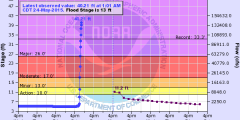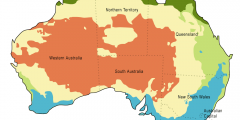Improving climate change communications: moving beyond scientific certainty
June 8, 2015
This is a co-authored post with Gregory Hollin. It is based upon our new paper in Nature Climate Change, which is the first piece of original research from science and technology studies (STS) published in the journal. In the last 25 years scientists have become increasingly certain that humans are responsible for changes to the …
Extreme weather talk: The sequel
June 4, 2015
Two years ago I published a blog post on extreme weather. This showed that unlike media reporting on climate change, which has generally been going down since 2007 (with some variations and a bit of an upsurge now, see Max Boykoff’s graph at CSTPR), media reporting on ‘extreme weather’ seems to be going up more …
Climate linguistics
May 18, 2015
In a recent news article about the origins and spread of the concept ‘climate denial’, the E&E reporter Jean Chemnick refers to me as a specialist in ‘climate linguistics’. Somebody asked me on twitter whether this field existed and some people searched my academia profile to find out more. I myself also googled around a …
Lukewarmers
May 14, 2015
On 3 May (2015) Tamsin Edwards wrote an article for The Observer entitled “The lukewarmers don’t deny climate change. But they say the outlook’s fine” (see here for a discussion; I should point out that Tamsin didn’t choose the title for this article). This prompted Steven Mosher to write the following comment: “Lukewarmers have come …
Climate scepticism in Australia
May 8, 2015
Much has been written about those who doubt various tenets of mainstream climate science. Much of this literature has focused on the United States. Far less attention has been paid to Australia, despite the fact that climate change has emerged as a central issue for Australian politics and science. When studying the use of various …
Basic science and climate politics: A flashback to 1989
February 20, 2015
We were trying to empty a room for refurbishment. So we rummaged through some old papers which included amongst many others: Karl Popper’s last paper entitled “Towards an evolutionary theory of knowledge” (with the enigmatic scribble: ‘Popper’s last paper is better than ‘Krapps last tape’), and a typescript from 1989 of a speech by Margaret …
Hottest year on record
January 25, 2015
Media reporting on climate change has heated up a little bit over the last ten days or so, after an announcement by NASA and NOAA which read like this: “NASA, NOAA Find 2014 Warmest Year in Modern Record”. This was taken up by the media and, between 15 January and 25 January 2015, the phrases …
Mind change: Some thoughts on the moral implications of metaphors
August 10, 2014
This quick post was prompted by Andrew Anthony’s article in The Observer on Susan Greenfield’s forthcoming book Mind Change and subsequent exchanges on twitter. Some background Metaphors are essential to the development of science and indispensable to science communication. I have been fascinated by metaphor for a long time, well before I became fascinated by …
Climate fiction: The anticipation and exploration of plausible futures
July 27, 2014
A few days ago Paul Collins asked me whether an emerging fictional genre, namely climate fiction or cli-fi, could help engage people with climate change. I had to confess that I had come across this new genre but had not thought about it in depth. This type of ignorance and confusion has never prevented me …










